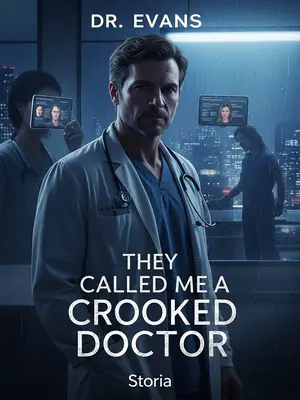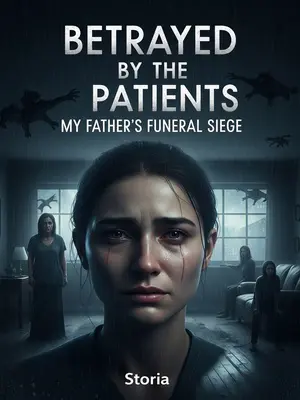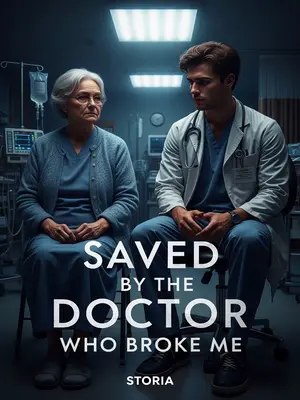Chapter 1: The Weight of Rounds
“Uh, Dr. Monroe? Time for rounds.”
At eight a.m. sharp, Benji, the new intern, hovered in my doorway, clearing his throat and glancing at his watch. He clutched his notepad like a life preserver—knuckles white, eyes wide. There was always a tense respect from the newbies, especially when they realized I was that Dr. Monroe—the one everyone whispered about in the break room.
“Alright.”
I nodded, pushed back from my cramped desk, and walked out of my office.
My office was tiny, wedged between Radiology and the always-busy nurses’ station. The hallway already hummed with pagers and intercoms—code blues, pharmacy calls, the steady pulse of a hospital that never really slept.
A loose huddle of seven or eight interns trailed behind as we started rounds.
They scribbled furiously, shooting nervous glances my way, like I might quiz them on the spot. The air was thick with the scent of disinfectant and burnt coffee drifting from the nurses’ station—a strangely comforting smell when you’ve spent years in these halls.
“How are you feeling today? Any headaches?”
“Family, keep the patient’s diet light—no fried or spicy foods for now.”
“You’re recovering well after surgery. Stay positive, okay?”
...
I checked each patient’s condition carefully and gave instructions to their families.
Little moments grounded me—a kid flashing a weak grin as I ruffled his hair, a grandmother squeezing my hand. No matter how tired I was, I made a point of meeting every patient’s eyes. That kind of respect still mattered here.
“Dr. Monroe, my husband…”
“Dr. Monroe, my dad…”
“Dr. Monroe…”
Every room, family members crowded around, peppering me with questions. Some asked about surgery schedules, others wanted to know when their loved one could go home. Sometimes, someone would ask if brain surgery could make you smarter—usually a teenager joking, earning a mortified glare from their parents. I’d grin, answer as honestly as I could, and move on. In hospitals, you never know what someone’s going to say.
Even so, I answered every question with patience.
I learned long ago that what sounds naive is usually just hope in disguise. A doctor who doesn’t listen shouldn’t be practicing. I gave every worried spouse a real answer, even when I was running on four hours of sleep.
An hour and a half later, rounds were done. I returned to my office to organize medical records.
My desk was a battlefield of charts, sticky notes, and the ever-present to-go coffee from the hospital café. I flexed my fingers before diving in—a small ritual before facing the mountain of paperwork.
At ten, the department head called a meeting.
The usual: PowerPoint slides, donut holes from the admin assistant, a rundown of census numbers, insurance headaches, and the never-ending reminders about patient satisfaction scores.
By ten-thirty, I was back, reviewing charts.
The clock ticked louder after meetings. I double-checked medication orders, signed off on discharge notes, and scanned my email for urgent consult requests.
At eleven forty, I went to the cafeteria for lunch—turkey sandwich, bag of chips, and coffee.
The cafeteria was packed as always. I waited in line behind a couple of nurses debating whether Dunkin’ or Starbucks had better coffee, their laughter echoing over the clatter of trays. I grabbed my usual—turkey sandwich, Lays, black coffee—and found a corner seat. The TV overhead blared local news, but I tuned it out.
At noon, I took a quick break in the staff lounge.
Fifteen minutes on a battered leather couch, staring at faded sports posters and a half-dead ficus. I closed my eyes, letting the hum of the vending machines blur the edges of my fatigue.
At two, I was on call, ready for anything the wards could throw at me.
My pager was clipped to my belt, green light blinking steadily. I checked it every few minutes, always half-expecting a code to send me running. The on-call hours were a mental marathon—never fully at rest, never truly relaxed.
At five thirty, I wrapped up for the day.
I gathered my coat, checked my pockets for stray pens, and waved to the security guard on my way out. My steps echoed in the almost-empty hallway. The day was done, but my mind never really left the wards.
This is my routine—a mix of busy and calm, repeating day after day.
It’s a rhythm you settle into, like breathing. There’s comfort in the predictability, even when the work itself is anything but predictable. Some days the weight of it all felt heavier than others.
“Someone as accomplished as Dr. Monroe, ending up like this—who would've thought? Life is wild.”
“Seriously. Sometimes I wonder if I made the right call going into medicine.”
“I've heard a bit about Dr. Monroe's situation. I really feel bad for him. Isn't it normal to charge a specialist fee? Why's it suddenly a scandal for him?”
“You don't get how fickle people can be. When they need you, you're a hero. Once they're better, it's like you owe them.”
“Honestly, Dr. Monroe has a great temperament. If it were me, I'd have quit a long time ago.”
“Um... seniors, I'm new here. Can someone tell me what happened to Dr. Monroe?”
“Let me tell you, Dr. Monroe, he…”
...
The office door was open, and a few interns who’d followed me on rounds were whispering in the hallway.
They clustered just outside, voices lowered but not low enough. Sneakers squeaked on the linoleum, and one girl twirled her stethoscope nervously.
“Don’t you all have work to do? Did you come here to learn or to gossip?”
My voice was calm but carried the kind of weight that comes from authority—or exhaustion. I leaned against the doorframe, arms folded.
“You—go check on the patients and record their meals and bathroom breaks.”
“And you, head to the nurses’ station and help count the afternoon’s medication usage. Double-check everything—no mistakes.”
I spoke quietly but firmly, not needing to raise my voice. Just a steady look and a few precise words. The interns snapped to attention like kids caught sneaking out after curfew.
The hallway went dead silent. The interns froze, then scattered—gone in a flash.
My jaw unclenched. Maybe I was too hard on them, but some days, all I had left was discipline.
“Kids these days really are gutsy.”
I shook my head, half amused.
I remembered being an intern myself: if I’d dared to linger in the hallway chatting, the attending docs would have chewed me out until I wanted to disappear.
Back then, just hearing an attending’s footsteps was enough to send us scattering like pigeons in the park. Some things change—and some never do.
As I gathered my things for the department meeting, my desk phone rang.
“Dr. Monroe, could you come to the outpatient clinic?”
The voice on the other end was urgent. I set aside my notepad, checked my watch, and headed out, bracing myself for whatever the day would throw at me next.













